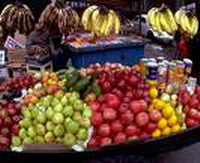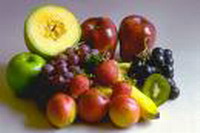Login form
Vitamin

A vitamin is an organic compound required as a nutrient in tiny amounts by an organism. A compound is called a vitamin when it cannot be synthesized in sufficient quantities by an organism, and must be obtained from the diet. Thus, the term is conditional both on the circumstances and the particular organism.
Vitamin A:
Vitamin A is a group of compounds that play an important role in vision, bone growth, reproduction, cell division, and cell differentiation Vitamin A helps regulate the immune system, which helps prevent or fight off infections by making white blood cells that destroy harmful bacteria and viruses Vitamin A also may help lymphocytes fight infections more effectively.
Retinol is found in foods that come from animals such as whole eggs, milk, and liver. Provitamin A carotenoids are abundant in darkly colored fruits and vegetables,carrots, cantaloupes, sweet potatoes, and spinach .
Vitamin B:
There's more than one B vitamin. Here's the list: B1, B2, B6, B12, niacin, folic acid, biotin, and pantothenic acid.
The B vitamins are important in metabolic activity — this means that they help make energy and set it free when your body needs it. So the next time you're running to third base, thank those B vitamins. This group of vitamins is also involved in making red blood cells, which carry oxygen throughout your body. Every part of your body needs oxygen to work properly, so these B vitamins have a really important job.
Foods are rich in vitamin B: whole grains, such as wheat and oats, fish and seafood, poultry and meats, eggs, dairy products, like milk and yogurt, leafy green vegetables, beans and peas,…
Vitamin C:
This vitamin is important for keeping body tissues, such as gums and muscles in good shape. C is also key if you get a cut or wound because it helps you heal. This vitamin also helps your body resist infection. This means that even though you can't always avoid getting sick, vitamin C makes it a little harder for your body to become infected with an illness.
Foods are rich in vitamin C: citrus fruits, like oranges ,cantaloupe, strawberries, tomatoes, broccoli, cabbage, kiwi fruit, sweet red peppers,….
 Vitamin D:
Vitamin D:
No bones about it . . . vitamin D is the vitamin you need for strong bones! It's also great for forming strong teeth. Vitamin D even lends a hand to an important mineral — it helps your body absorb the amount of calcium it needs.
Foods are rich in vitamin D: milk fortified with vitamin D, fish, egg yolks, liver, fortified cereal,….
Vitamin E:
Everybody needs E. This hard-working vitamin maintains a lot of your body's tissues, like the ones in your eyes, skin, and liver. It protects your lungs from becoming damaged by polluted air. And it is important for the formation of red blood cells.
Foods are rich in vitamin E: whole grains, such as wheat and oats, wheat germ, leafy green vegetables, sardines, egg yolks, nuts and seeds,…
Vitamin K:
Vitamin K is the clotmaster! Remember the last time you got a cut? Your blood did something special called clotting. This is when certain cells in your blood act like glue and stick together at the surface of the cut to help stop the bleeding.
Foods are rich in vitamin K: leafy green vegetables, dairy products, like milk and yogurt, broccoli, soybean oil,….

